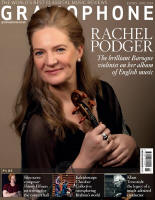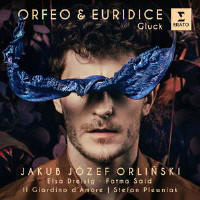Texte paru dans: / Appeared in:
Erato: 5419789753
|
|
|
|
|
|
It is clear from his introductory note in the booklet that the moving spirit behind this recording is Jakub Józef Orlin´ski: he was responsible for the casting, and he describes himself as producing and co-directing the project with the conductor, Stefan Plewniak. The result is a fine account of Gluck’s opera in the original version of 1762, on a par with the recordings led respectively by Michael Chance and Iestyn Davies.
The Overture, surprisingly cheerful given the solemnity of the action, is briskly dispatched, the prominence of the brass fanfares giving it a martial air. The ensuing chorus of lamentation is punctuated by Orfeo’s cries of ‘Euridice!’. From then on, the opera is dominated by Orpheus, Eurydice not being heard until the last of the three acts. The part was written for Gaetano Guadagno, an alto castrato admired by Handel. Orlin´ski’s countertenor is well suited to the role. The sweetness of his tone, smooth across his entire compass, is apparent from his first aria, the threefold ‘Chiamo il mio ben così’, and the accompagnato between the stanzas – there is no secco recitative in the opera – is restrained but heartfelt. Like Davies on the Pentatone recording, Orlin´ski could perhaps show a greater sense of wonder as he enters the Elysian Fields with ‘Che puro ciel’, but he manages not to sound too cheerful in ‘Che farò senza Euridice’; as ever, I miss the greater intensity of the expanded ending in the revision that Gluck wrote for Paris. On the debit side, Orlin´ski’s tendency earlier on to treat appoggiaturas as acciaccaturas gives a jerky feel to his otherwise impeccable legato; and he lingers far too long over a couple of cadences.
Amore – Cupid – is sung by Fatma Said, who took the part on the DVD of the Paris version from La Scala (Belvedere, 5/19). She over-decorates ‘Gli sguardi trattieni’, but the bounce of the faster sections suggests that she would make an excellent Despina in Così fan tutte. Elsa Dreisig is a strong Euridice, giving Orfeo a really hard time when she complains of his apparent coolness on their journey back from the
Underworld. The opening accompagnato to Act 3 is vividly done by all concerned. Spirited in the duet, Dreisig is fiery in the C minor passion of ‘Che fiero momento’.
The orchestra and 15-strong chorus of Il Giardino d’Amore play and sing beautifully, and Plewniak conducts with a sure hand, give or take a few quirks: the introduction to Act 2 is ponderous, and the cadence before ‘Che farò’ (loud-pause-softcrescendo) is just fussy. All the dances before the final ensemble are included, with most of the repeats. The performance is well worth hearing, without displacing the recordings listed below. |
|




